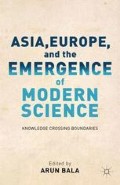Abstract
The world is on the cusp of great changes—political, economic, and physical. Economic and political power is shifting from the mature economies and democracies to rapidly developing countries such as China and India. Such fundamental shifts may have implications for an epistemological shift from “West” to “East.” The philosophical paradigm behind the modern revolution in science since the seventeenth century underpins the rise of Western supremacy for the last two centuries or so. That paradigm, its entailed methodology, including its understanding of causal agency and logic are being severely challenged by the crisis of global climate change and sustainability, as well as more spectacularly the meltdown of the global financial system. George Soros1 has correctly argued that the cause of the latter lies in the inherently flawed nature of the causal paradigm behind market fundamentalism; an analogous flaw appears to have retarded the recognition that a climate change crisis confronts humankind. Soros proposes the alternative paradigm of reflexivity, which this author sees but as a subspecies of a more general paradigm involving a “post-postmodern concept of cause and logic” that is non-Humean and non-Aristotelian, being nonlinear, necessarily multifactorial and reciprocal, nonreductionist in character, and holistic in its metaphysics. One may argue that this kind of “ecosystemic science” was pioneered, though not perhaps self-consciously, by the ancient Chinese
in their theory and practice of “Traditional Chinese Medicine,” although for the purpose of this chapter, the term “Classical Chinese Medicine” is preferred.
Access this chapter
Tax calculation will be finalised at checkout
Purchases are for personal use only
Preview
Unable to display preview. Download preview PDF.
End Notes
See George Soros, “The Crisis and What to Do About It,” New York Review of Books. December 4, 2008, 19; The New Paradigm for Financial Markets: The Credit Crisis of 2008 and What It Means (London: Public Affairs Ltd., 2008).
See Keekok Lee, The Natural and the Artefactual: The Implications of Deep Science and Deep Technology for Environmental Philosophy (Lanham, MD: Rowman & Littlefield, 1999).
Keekok Lee, Social Philosophy and Ecological Scarcity (London: Routledge, 1989, 70).
Joseph Needham, Kenneth Robinson, and Ray Huang, Science and Technology 7, part 2 (Cambridge: Cambridge University Press, 2004).
A recent major publication in English helps to reinforce this misleading view: Antonio S. Cua, ed. Encyclopaedia of Chinese Philosophy (London, Routledge, 2003).
See Richard J. Smith, Fathoming the Cosmos and Ordering the World: The Yijing and Its Evolution in China (Charlottesville: University of Virginia Press, 2008, 18–19). Recent scholarship of this text has also been greatly affected by the discovery in the Mawangdui excavation of a version earlier than any extant version. It throws doubt on the generally held belief, down the ages, that Confucius had a hand in editing Yi Jing.
See Val Plumwood, Feminism and the Mastery of Nature (London: Routledge, 1993).
The author would like to emphasize that what is said here and, indeed in the whole of this chapter should not be misunderstood to mean that the ancient Chinese argued explicitly for these ideas in the way set out here—suffice it to say that such drawing out on the part of the author is compatible and coherent with what is commonly attributed to the ancient Chinese texts cited here. On fuzzy logic, see: http://plato.stanford.edu/entries/logic-fuzzy/; Bart Kosko, Fuzzy Thinking: The New Science of Fuzzy Logic (London: Flamingo, 1994).
One may try to argue that this is not a counter-example to the law of non-contradiction, as behind the two seemingly contradictory propositions stand the following true proposition: “this litre glass contains half a litre of liquid.” However, this simply shows that the reformulated version does not violate the law of identity, and not that as in the original version—“this glass is half empty” and “it is not the case that this glass is half empty”—are not both true at the same time. Another point that is very important to comment on briefly here is the usual charge that from contradictory premises any inference can be made. However, some logicians have begun to challenge this orthodoxy, through their work on paraconsistent logic. (I owe this point to Andrew Brennan.) See Graham Priest and Koji Tanaka. “Paraconsistent logic,” http://plato.stanford.edu/entries/logic-paraconsistent/, 2009.
Editor information
Copyright information
© 2012 Arun Bala
About this chapter
Cite this chapter
Lee, K. (2012). Toward Constructing Post-Postmodern Twenty-First Century Sciences: The Relevance of Classical Chinese Medicine. In: Bala, A. (eds) Asia, Europe, and the Emergence of Modern Science. Palgrave Macmillan, New York. https://doi.org/10.1057/9781137031730_12
Download citation
DOI: https://doi.org/10.1057/9781137031730_12
Publisher Name: Palgrave Macmillan, New York
Print ISBN: 978-1-349-44083-2
Online ISBN: 978-1-137-03173-0
eBook Packages: Palgrave History CollectionHistory (R0)

